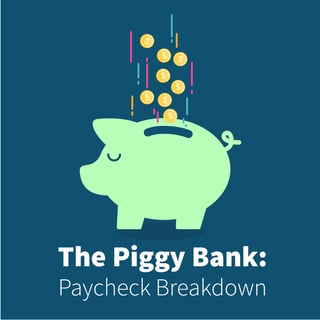The Piggy Bank: Paycheck Breakdown
I can picture it now, your teen hears, “8 dollars an hour” and in their mind that means $320.00 a week that is if they can work 40 hours. But when they get that first pay check, they will be unpleasantly surprised that they don’t get to take all that money home. Perhaps we can step in and help; help them understanding what tax withholding is, what they qualify for and where those deductions are documented but, in order to do that, we must understand ourselves!
 Tax withholding is a portion of money that gets taken out of each paycheck. These monies go into multiple “buckets” including; social security benefits in retirement, Medicare which provides medical insurance to Americans over 65 and individuals with disabilities, Federal income tax (taxes to the federal government) and State income tax (taxes that go to the state government). Teens, no matter what the income amount is, are required to contribute to Social Security and Medicare. However, taxes are a bit different, particularly state taxes. Each state has different requirements for teens paying state income tax, in your state it may not be required, so check your local laws along with your teen to determine your circumstance. Now for Federal taxes. If your teen earned less than $6,300 during that year then they can claim exemption from income tax withholding. They will need to give their employer a new W-4 showing the exemption. If federal taxes have already been withheld, then your teen will need to file for a tax return to get the refund of those taxes that were withheld. It is recommended that you sit down with your teen to determine what he or she will make as income over that next year so the W-4 can be filled out correctly.
Tax withholding is a portion of money that gets taken out of each paycheck. These monies go into multiple “buckets” including; social security benefits in retirement, Medicare which provides medical insurance to Americans over 65 and individuals with disabilities, Federal income tax (taxes to the federal government) and State income tax (taxes that go to the state government). Teens, no matter what the income amount is, are required to contribute to Social Security and Medicare. However, taxes are a bit different, particularly state taxes. Each state has different requirements for teens paying state income tax, in your state it may not be required, so check your local laws along with your teen to determine your circumstance. Now for Federal taxes. If your teen earned less than $6,300 during that year then they can claim exemption from income tax withholding. They will need to give their employer a new W-4 showing the exemption. If federal taxes have already been withheld, then your teen will need to file for a tax return to get the refund of those taxes that were withheld. It is recommended that you sit down with your teen to determine what he or she will make as income over that next year so the W-4 can be filled out correctly.
Once they do get their first paycheck, look over it with them and point out the areas where they can find these tax withholdings so they can become familiar with reviewing their checks. This is also a good time to point out the difference between gross income (the amount made before deductions) and net income (the amount they will be “taking home” with them).
The better we can help our teens figure out the financial smarts needed in the world we live in, the better they will be in the future! Another great topic to review is Credit! If you are looking for more information on how credit works, check out our Understanding Credit Guide. It’s available for free download here:
**This is for informational purposes only; please consult an attorney or accountant for tax advice.
